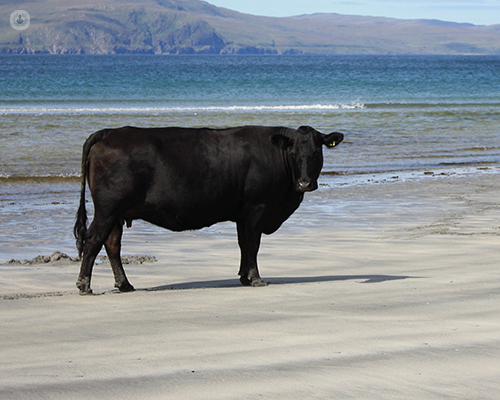Cow’s milk protein allergy vs. lactose intolerance: what is the difference?
Written by:Cow’s milk protein allergy (CMPA) is a very common condition in babies worldwide, with between 2% and 7.5% of babies affected before the age of one, with the number on the rise. Luckily, most children grow out of the allergy by the age of two to five.

Types of cow’s milk protein allergy
There are two main types of cow’s milk protein allergy, IgE mediated, and Non-IgE mediated. The main difference between these two types is that children will often grow out of non-IgE mediated cow’s protein allergies much quicker than the IgE mediated type.
Symptoms of cow’s milk protein allergy
In some cases, the allergy can be seen even when the baby is breastfed, as the milk protein passes from the mother’s diet into her milk. IgE mediated allergy can present as soon as the baby is given milk by breast or formula. The reaction can be severe in the form of vomiting, rash and difficulty in breathing.
On the other hand, in Non IgE mediated allergy the onset is insidious and may present as late as 4-6 weeks of age.
If you are concerned that your child is suffering with a cow’s milk protein allergy, you can check for the following symptoms:
- a red itchy rash on the skin
- swelling of the lips
- face swelling, especially around the eyes
- stomach ache
- vomiting
- colic
- diarrhoea or constipation
- runny or blocked nose
- eczema that doesn’t improve with treatment
If your child suffers from a severe allergic reaction, such as severe swelling of the face and throat, coughing and difficulty breathing, call 999 or go to the hospital emergency department.
Treatment for cow’s milk protein allergy
If you are concerned that your child may have a cow’s milk protein allergy, a specialist will be able to provide advice on managing the allergy.
Treatment will involve the complete removal of cow’s milk from your child’s diet, including a change to the type of formula you use. If your child is breastfed, all dairy products should be removed from the mother’s diet like cheese, yoghurt, butter, milk etc.
What is the difference between cow’s milk protein allergy and lactose intolerance?
The important distinction between lactose intolerance and cow’s milk protein allergy is that lactose intolerance is not an allergy meaning the symptoms are usually less severe, and may come and go. It is not that common in children. It can occur as transient lactose intolerance after a severe prolonged episode of diarrhoea in children lasting more than one week.
Lactose intolerance is a different kind of reaction to milk, and is when the body can’t digest the natural sugars found in milk.
Symptoms of lactose intolerance include:
- diarrhoea
- vomiting
- upset stomach
- wind
Treatment for lactose intolerance
Treatment for lactose intolerance varies, depending on the severity of the intolerance. Usually treatment includes a change of diet, and to cut down or to avoid lactose in your food. Your child may be able to consume small amounts of lactose without experiencing any symptoms. There are some Lactose free formulae available in the market like SMA Lactose free which can be used for 2-3 weeks till they start tolerating normal milk. Soya milk can be tried as well.
Make a booking with a consultant paediatrician to learn more about managing your child’s lactose intolerance.


